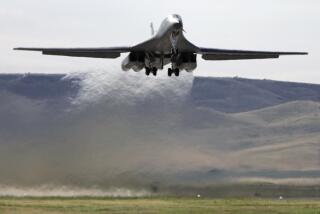Study Likely to Oppose Doubling of B-2 Purchases : Defense: It calls a 20-bomber fleet adequate, but critics say it assumes the U.S. will have 14 days to prepare for regional wars.
- Share via
WASHINGTON — A key study of the Northrop Grumman B-2 bomber is expected to recommend against any additional purchases of the aircraft, a setback to Northrop’s campaign to sell 20 more planes to the Pentagon for an estimated $15 billion.
Defense officials declined Friday to discuss the study, which is already drawing pointed criticism because it was based on allegedly flawed assumptions. Pentagon officials also cautioned the study will not actually be completed until later this month, though Defense Secretary William Perry received a preliminary briefing earlier this week.
The Pentagon picked the Institute for Defense Analysis, a Pentagon-sponsored research group, last year to conduct a study of the Air Force’s bomber requirements. The study was mandated by Congress, based on concerns that the decision to end B-2 production in 1998 after only 20 aircraft was a mistake.
Northrop has aggressively been trying to sell the bombers this spring as Congress considers the 1996 defense budget and had hoped the institute’s study would lay an intellectual foundation to support its lobbying campaign.
About 30,000 jobs at Northrop and other firms in California are supported by the B-2 program, still one of the largest defense projects in the world.
But the study found that U.S. forces can adequately contain future regional wars with the currently planned force of 20 B-2s, backed by tactical fighters and precision weapons, according to industry, congressional and defense sources.
However, the analysis is based partly on the assumption that the U.S. would have 14 days of warning before the outbreak of hostilities, allowing the Pentagon to dispatch forces from the U.S. and tons of equipment positioned in depots around the world.
The assumption of a 14-day warning period caught many experts by surprise because it seems militarily risky and unrealistic, they said. However, analysts at the Joint Chiefs of Staff in the Pentagon have tested the theory in computer exercises, code named Nimble Dancer, according to a congressional military expert.
The exercises showed that the Pentagon’s existing forces could successfully respond to two nearly simultaneous regional wars--as long as there was two weeks of warning, said the congressional expert, who asked not to be identified.
A force of 40 B-2s has been touted by supporters as the only means of stopping a surprise military incursion into foreign territories, such as Saudi Arabia or perhaps South Korea.
Northrop has asserted that only the B-2 can delivery large payloads of bombs anywhere in the world, operating virtually undetected by radar thanks to its stealth shape and reinforced plastic structure.
Yet, making the assumption that surprise military attacks will not occur deflates the case for additional for B-2s.
“A 14-day warning time assumption is tailor made to undercut the argument of B-2 proponents,” said Loren Thompson, a defense expert at the Alexis de Tocqueville Institution, a think tank. “The strongest case for the B-2 is that it is most critical in (the) first weeks of a war.”
How much effect the study will have on the B-2 debate in Congress this year is not yet clear. If the study lacks credibility, then supporters are not likely to change their position, congressional sources said.
A spokesman for Rep. Duncan Hunter (R-El Cajon), chairman of the House National Security Committee’s procurement subcommittee, said the study is not likely to affect Hunter’s support for the bomber.
Donald Hicks, a Northrop consultant and former under secretary of defense, called the 14-day assumption “ridiculous.”
“If this report turns out to be lacking in credibility, then it will reflect negatively on the Institute for Defense Analysis,” Hicks said.
Glenn Buchan, a RAND Corp. military analyst whose reports generally support more B-2s, said the overall current debate on the B-2 fails to address important military issues. Buchan said the Pentagon should be comparing the capability of bombers to aircraft carriers and bombers to ground forces.
But it is a highly sensitive issue that the Pentagon has largely avoided.
*
* F-22 SLOWDOWN?
Another study recommends a cutback in production. D2
More to Read
Inside the business of entertainment
The Wide Shot brings you news, analysis and insights on everything from streaming wars to production — and what it all means for the future.
You may occasionally receive promotional content from the Los Angeles Times.











